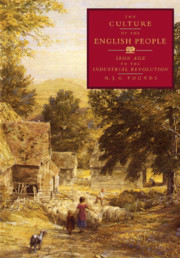Book contents
- Frontmatter
- Contents
- List of illustrations
- List of tables
- Preface
- List of abbreviations
- Map of traditional counties, with abbreviations, as used in this book
- Introduction
- 1 The view from Danebury
- 2 Roman interlude
- 3 House and household
- 4 Heat, light and insecurity
- 5 The house furnished
- 6 Food, its production, preservation and preparation
- 7 In sickness and in death
- 8 The community of parish and village
- 9 The family
- 10 The culture of cities
- 11 The foundations of popular culture
- 12 Conclusion: the end of popular culture
- Notes
- Index
- Frontmatter
- Contents
- List of illustrations
- List of tables
- Preface
- List of abbreviations
- Map of traditional counties, with abbreviations, as used in this book
- Introduction
- 1 The view from Danebury
- 2 Roman interlude
- 3 House and household
- 4 Heat, light and insecurity
- 5 The house furnished
- 6 Food, its production, preservation and preparation
- 7 In sickness and in death
- 8 The community of parish and village
- 9 The family
- 10 The culture of cities
- 11 The foundations of popular culture
- 12 Conclusion: the end of popular culture
- Notes
- Index
Summary
Operationally defined, a culture is a constantly recurring assemblage of artefacts. To present the culture as a system, it is useful to consider not only the preserved artefacts, but the members of the society that produced them, the natural environment they inhabited and other artefacts (including the non-material ones such as language and projective systems) which they made or used.
Colin RenfrewEvery culture, every era exploits some few out of a great number of possibilities. Changes may be very disquieting, and involve great losses, but this is due to the difficulty of change itself, not to the fact that our age and country has hit upon the one possible motivation under which human life can be conducted.
Ruth Benedict‘Culture’ is a word with many shades of meaning, all of them deriving in some way from its Latin root, cultus. Whether as a noun or as an adjective, cultus implied cultivation and a sense of growth, and, however used, ‘culture’ has always suggested a degree of sophistication and refinement. Today it can be taken to indicate people of education and taste as well as an assemblage of pots and artefacts from a prehistoric site. In the context of this book it is used to denote the body of ideas which a people holds about itself and its environment, together with the tools and artefacts by means of which its members relate to one another and to the world which they inhabit.
- Type
- Chapter
- Information
- The Culture of the English PeopleIron Age to the Industrial Revolution, pp. 1 - 15Publisher: Cambridge University PressPrint publication year: 1994



